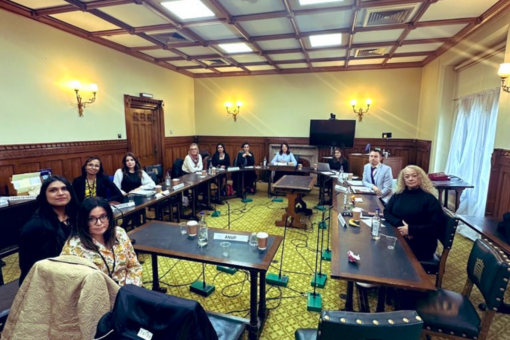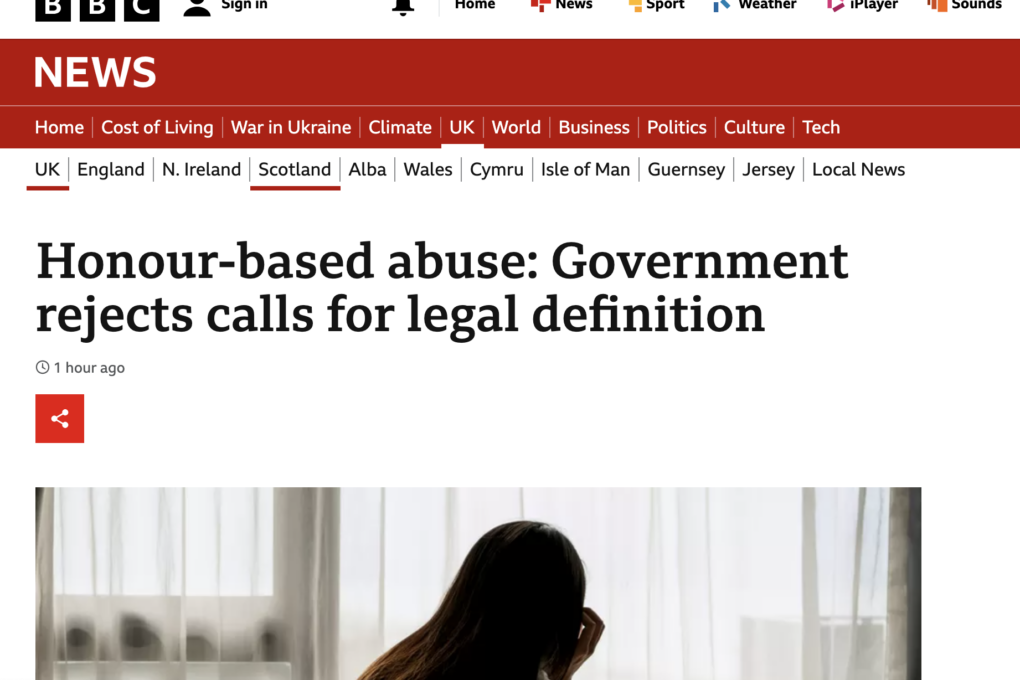
Today, Karma Nirvana has written to the Home Secretary, the Rt Suella Braverman MP, about our concerns in the Government’s response to the Women and Equality Committees Inquiry into Honour Based Abuse. Of particular concern is the government’s rejection of the Committee’s recommendation for a statutory definition of Honour-Based Abuse.
The inquiry, welcomed by Karma Nirvana, examined the prevalence of Honour Based Abuse in the UK and looked at the extent to which the government, police and other services understand the issues and the support available to help victims. The inquiry’s key findings highlighted significant variations in how honour based abuse is understood and addressed and set out recommendations for the government.
Today, the government published its response to the Inquiry’s recommendations. Whilst we welcome the commitments made in their response, we remain very concerned about the huge gaps that remain for victims and survivors of Honour Based Abuse.
We are pleased that the government launched its £8.3 million fund for ‘by and for’ specialist organisations, recognising the importance of ringfence funding specifically for ‘by and for’ services. In the government’s response to the Inquiry, they have referenced that the £8.3 million fund covers many Honour Based Abuse organisation, however, from the list of recipients that were awarded funding, only one organisation was specific to supporting victims and survivors of Honour Based Abuse. Furthermore, this project is limited to one region and accounts for 3.8% of the funding going towards victims and survivors of Honour Based Abuse.
We are pleased to see the government recognise in their response the witnesses with lived experience that provided evidence to the Committee. The Women and Equality Committee held a closed oral evidence session with Karma Nirvana’s Survivor Ambassadors. They shared their experiences of honour based abuse and made many recommendations on how the government could better support victims and survivor. During the closed session, the Survivor Ambassadors advocated for a statutory definition, highlighting that this would improve identification and response to honour based abuse by frontline professionals.
Sondos and Asma, from the Survivor Ambassador, expressed:
“As a survivor of Honour-Based Abuse who presented evidence to the committee, I find it extremely disheartening that our call for a statutory definition of Honour Based Abuse has been rejected by the government. Honour-Based Abuse is too frequently normalised by perpetrators and wider communities, leading to a collective gaslighting of victim-survivor experience.
Unfortunately, the government’s failure to listen and respond to this appropriately further invalidates us.
Sondos
As a survivor and also a healthcare professional, I am often asked by colleagues to deliver training and explain what Honour-Based Abuse is. The concept of ‘honour’ cuts across communities from black, brown, and white. It is abuse, it is about perpetrators afflicting power and control on those they oppress. It is short-sighted not to approve a definition because there is uncertainty about its impact. There is no uncertainty that abuse is wrong.
Asma
Karma Nirvana are extremely disappointed by the Government’s response to the Inquiry. The rejection of the Committee’s substantive recommendations misses a huge opportunity to make a difference in the lives of those impacted by Honour Based Abuse. Whilst the Government hasn’t accepted the recommendations, we will carry on pushing for all of the recommendations to be implemented. Karma Nirvana intends to call for a statutory definition for Honour Based Abuse, utilising the opportunity to table an amendment in the Victims and Prisoners Bill.
Karma Nirvana remains committed to collaborating with the government to enhance responses to Honour Based Abuse victims.
Recommendations from Inquiry
Prevalence
- There is inconsistency in how data on honour-based abuse offences
is collected and recorded by the police. This is partly due to incorrect recording by police officers, either in failing to recognise an offence as honour-based, or in making an inaccurate assessment of the context. There is insufficient information provided in the published data, and the lack of ethnicity data makes it particularly difficult to know in which communities honour-based abuse occurs, in what forms, and how those communities are being served by police and other agencies. Data currently collected by children’s social care services does not allow for the prevalence of honour- based abuse amongst children and young people to be understood and monitored effectively at Government level. (Paragraph 23) - The Home Office, National Police Chiefs’ Council and College of Policing should publish refreshed guidance for forces on how to accurately and consistently record incidents of honour-based abuse. The Home Office should instruct police forces across England and Wales to collect specific information on victims and perpetrators of honour-based abuse, including data on their protected characteristics, and to report this to the Home Office as part of the existing Annual Data Requirement. (Paragraph 24)
- The Department of Health and Social Care and the Department of Education should add options for honour-based abuse to both the ‘primary need at first social work assessment’ and ‘factors identified at the end of the assessment’ categories in the ‘Children in need’ census. (Paragraph 25) Recognising honour-based abuse
- We welcome the steps taken by the police service in response to the concerns raised in the super-complaint on honour-based abuse brought by Liberty and the Halo Project in 2020. However, there is still more work to be done if victims of honour-based abuse are to feel empowered to report the crimes against them and feel confident that they will be safeguarded against further harm. People subject to honour-based abuse take huge risks in reporting the crimes against them, and it is critical that the public services in place to protect them are able to recognise that abuse at the first opportunity. (Paragraph 37)
- In response to this Report, the Government should set out the progress made in implementing the national training package for frontline police officers on recognising so-called honour-based abuse. The Government must also set out the steps it will take to ensure those working in other safeguarding roles, including in social services and education, are trained to recognise honour-based abuse and not deterred from tackling it by cultural sensitivity. (Paragraph 38)
- The Government must include specific questions on honour-based abuse in the Domestic Abuse Risk Assessment tool to help both victims and police officers identify risks confidently and accurately. (Paragraph 39)
- The Government is currently reviewing the content of relationships, sex and health education (RSHE) taught in schools. It is clear from the evidence we received that the teaching of honour-based abuse is currently inadequate. The ongoing review of RSHE should consider how the teaching of honour-based abuse should be improved across educational settings. (Paragraph 42)
- In order to tackle so-called honour-based abuse effectively, it is crucial there is shared understanding of it across all agencies. The introduction of a statutory definition of honour-based abuse would contribute to social and professional understanding, help to improve data collection and ultimately assist in bringing more perpetrators to justice. (Paragraph 48)
- The Government should introduce a statutory definition of honour-based abuse. It should consult a wide range of experts, specialist by-and-for services and survivors of honour-based abuse on framing the definition using the existing Crown Prosecution Service definition as a starting point. The definition, once finalised, should be accompanied by statutory multi- agency guidance. (Paragraph 49) Supporting victims and reforming the law
- Abusers use the insecure immigration status of their victims to deter
and prevent them from seeking support, exploiting fears that reporting abuse to the police will lead to action against the victim by Immigration Enforcement. We are not satisfied that the Immigration Enforcement Migrant Victims Protocol proposed by the Home Office, which prevents immigration enforcement action against that victim only while investigation and prosecution proceedings are ongoing, and the victim is receiving support to make an application to regularise their stay, is sufficient to mitigate those concerns. (Paragraph 58) - The Government should establish an appropriate firewall-type mechanism between the police and the Home Office to prevent data sharing for the purposes of enforcing immigration rules against victims of abuse. The firewall should be designed to ensure the police only share information with Immigration Enforcement on victims in exceptional circumstances, which must be narrowly defined and be for the purposes of assisting in the safeguarding of the individual or taking action against their abuser. If and when police become aware a victim has irregular immigration status, they should provide that person with information about local support services (including legal advice) and encourage them to seek advice on regularising their status. The National Police Chiefs’ Council guidance should be updated to reflect this. (Paragraph 59)
- By-and-for services, which are organisations designed and run by and
for people who are minoritised, are vital to ensuring victims of honour- based abuse receive the support they need. However, the sector is underfunded, and complex commissioning processes often prevent smaller specialist organisations from competing against generic and larger providers for the funding available. Such funding is also too often available only on a short term basis. (Paragraph 64) - The Government should increase the funding available to by-and-for services that support victims of honour-based abuse. The Government should commit to providing this funding across multiple years. It should also assess the merits of that funding being made available in a simple grant form so it is accessible to smaller organisations which lack the resources to compete with larger providers in complex commissioning processes. (Paragraph 65)
- The Support for Migrant Victims Scheme pilot has been valuable and we welcome its extension to 2025. However, there are shortfalls in funding to support victims with no recourse to public funds. We are concerned this is aggravated by the Government’s reservation on Article 59 of the Council of Europe Convention on preventing and combating violence against women and domestic violence (the ‘Istanbul Convention’). In order to help limit perpetrators’ ability to use a victim’s immigration status as a tool for control, the Government should reconsider its reservation to Article 59 of the Istanbul Convention. It should also consider extending eligibility to the Destitute Domestic Violence Concession scheme and Domestic Violence Indefinite Leave to Remain to all migrant victims. (Paragraph 75)
- We recognise the overwhelming majority of victims of honour-based abuse are female, but this must not detract from the experiences of male victims. We are concerned the inclusion of men and boys in strategies primarily aimed at women and girls fails to empower male victims and can contribute to underreporting. The Government should consider introducing a distinct honour-based abuse strategy aimed at male victims, parallel to that aimed at women and girls. Such a strategy might empower male victims to report the crimes committed against them and to seek support. (Paragraph 83)
- It is reassuring to hear judges have robustly rejected any attempts to use ‘honour’ to reduce a sentence. Explicitly recognising so-called honour
in sentencing guidelines would go further; it would strengthen the understanding that honour-based abuse is taken seriously by the criminal justice system and only ever as an aggravating factor. We recommend the Sentencing Council considers including motivations of honour as an aggravating factor in the domestic abuse guideline. (Paragraph 89)

